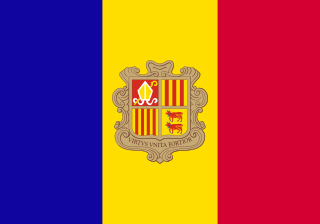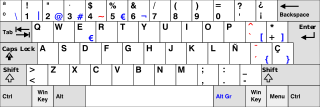This article needs additional citations for verification .(February 2024) |
| |||
|---|---|---|---|
| +... |
This article needs additional citations for verification .(February 2024) |
| |||
|---|---|---|---|
| +... |

Andorra, officially the Principality of Andorra, is a sovereign landlocked country on the Iberian Peninsula, in the eastern Pyrenees, bordered by France to the north and Spain to the south. Believed to have been created by Charlemagne, Andorra was ruled by the count of Urgell until 988, when it was transferred to the Roman Catholic Diocese of Urgell. The present principality was formed by a charter in 1278. It is currently headed by two co-princes: the bishop of Urgell in Catalonia, Spain and the president of France. Its capital and largest city is Andorra la Vella.

Barcelona is a city on the northeastern coast of Spain. It is the capital and largest city of the autonomous community of Catalonia, as well as the second-most populous municipality of Spain. With a population of 1.6 million within city limits, its urban area extends to numerous neighbouring municipalities within the province of Barcelona and is home to around 4.8 million people, making it the fifth most populous urban area in the European Union after Paris, the Ruhr area, Madrid and Milan. It is one of the largest metropolises on the Mediterranean Sea, located on the coast between the mouths of the rivers Llobregat and Besòs, bounded to the west by the Serra de Collserola mountain range.

Catalan, known in the Valencian Community and Carche as Valencian, is a Western Romance language. It is the official language of Andorra, and an official language of two autonomous communities in eastern Spain: Catalonia and the Balearic Islands. It is also an official language in Valencia, where it is called Valencian. It has semi-official status in the Italian comune of Alghero, and it is spoken in the Pyrénées-Orientales department of France and in two further areas in eastern Spain: the eastern strip of Aragon and the Carche area in the Region of Murcia. The Catalan-speaking territories are often called the Països Catalans or "Catalan Countries".

Catalonia is an autonomous community of Spain, designated as a nationality by its Statute of Autonomy.

A nation-state is a political unit where the state, a centralized political organization ruling over a population within a territory, and the nation, a community based on a common identity, are congruent. It is a more precise concept than "country", since a country does not need to have a predominant national or ethnic group.

Occitan, also known as lenga d'òc by its native speakers, sometimes also referred to as Provençal, is a Romance language spoken in Southern France, Monaco, Italy's Occitan Valleys, as well as Spain's Val d'Aran in Catalonia; collectively, these regions are sometimes referred to as Occitania. It is also spoken in Calabria in a linguistic enclave of Cosenza area. Some include Catalan in Occitan, as the distance between this language and some Occitan dialects is similar to the distance between different Occitan dialects. Catalan was considered a dialect of Occitan until the end of the 19th century and still today remains its closest relative.

Mallorca, or Majorca, is the largest island of the Balearic Islands, which are part of Spain, and the seventh largest island in the Mediterranean Sea.

The comarques of Catalonia, often referred to in English as counties, are an administrative division of Catalonia. Each comarca comprises a number of municipalities, roughly equivalent to a county in the United States. Currently, Catalonia is divided into 42 comarques and Aran, considered a "unique territorial entity" and not a comarca.

Valencian or Valencian language is the official, historical and traditional name used in the Valencian Community of Spain to refer to the Romance language also known as Catalan, either as a whole or in its Valencia-specific linguistic forms. The Valencian Community's 1982 Statute of Autonomy and the Spanish Constitution officially recognise Valencian as the name of the regional language.

Algherese or Alguerese is the variant of Catalan spoken in the city of Alghero, in the northwest of Sardinia, Italy.
The Generalitat de Catalunya, or the Government of Catalonia, is the institutional system by which Catalonia politically organizes its self-government as an autonomous community of Spain. It is formed by the Parliament of Catalonia, the Presidency of the Generalitat de Catalunya, and the Executive Council of Catalonia. It is ruled according to the Statute of Autonomy of Catalonia.

The Catalan Countries are those territories where the Catalan language is spoken. They include the Spanish regions of Catalonia, the Balearic Islands, Valencian Community, and parts of Aragon and Murcia (Carche), as well as the Principality of Andorra, the department of Pyrénées-Orientales in France, and the city of Alghero in Sardinia (Italy). It is often used as a sociololinguistic term to describe the cultural-linguistic area where Catalan is spoken. In the context of Catalan nationalism, the term is sometimes used in a more restricted way to refer to just Catalonia, Valencia and the Balearic Islands. The Catalan Countries do not correspond to any present or past political or administrative unit, though most of the area belonged to the Crown of Aragon in the Middle Ages. Parts of Valencia (Spanish) and Catalonia (Occitan) are not Catalan-speaking.

The Catalan independence movement is a social and political movement which seeks the independence of Catalonia from Spain.

Catalans are a Romance ethnic group native to Catalonia, who speak Catalan. The current official category of "Catalans" is that of the citizens of Catalonia, an autonomous community in Spain and the inhabitants of the Roussillon historical region in southern France, today the Pyrénées Orientales department, also called Northern Catalonia and Pays Catalan in French.

The majority of languages of Spain belong to the Romance language family, of which Spanish is the only language which has official status for the whole country. Those also include Catalan and Galician as well as an additional number of languages and dialects belonging to the Romance language continuum.

Catalonia is divided into 947 municipalities.
El Periódico de Catalunya, also simply known as El Periódico, is a morning daily newspaper based in Barcelona, Catalonia, Spain.

The Catalan dialects feature a relative uniformity, especially when compared to other Romance languages; both in terms of vocabulary, semantics, syntax, morphology, and phonology. Mutual intelligibility between its dialects is very high, estimates ranging from 90% to 95%. The only exception is the isolated idiosyncratic Alguerese dialect.

The Parliament of the Balearic Islands is the unicameral autonomous parliament of the Balearic Islands, one of the autonomous communities of Spain. The Parliament, composed of 59 elected seats, is located in the city of Palma, on the island of Majorca.
An independence referendum was held on 1 October 2017 in the Spanish autonomous community of Catalonia, passed by the Parliament of Catalonia as the Law on the Referendum on Self-determination of Catalonia and called by the Generalitat de Catalunya. The referendum, known in the Spanish media by the numeronym 1-O, was declared unconstitutional on 7 September 2017 and suspended by the Constitutional Court of Spain after a request from the Spanish government, who declared it a breach of the Spanish Constitution. Additionally, in early September the High Court of Justice of Catalonia had issued orders to the police to try to prevent the illegal referendum, including the detention of various persons responsible for its preparation. Due to alleged irregularities during the voting process, as well as the use of force by the National Police Corps and Civil Guard, international observers invited by the Generalitat declared that the referendum failed to meet the minimum international standards for elections.